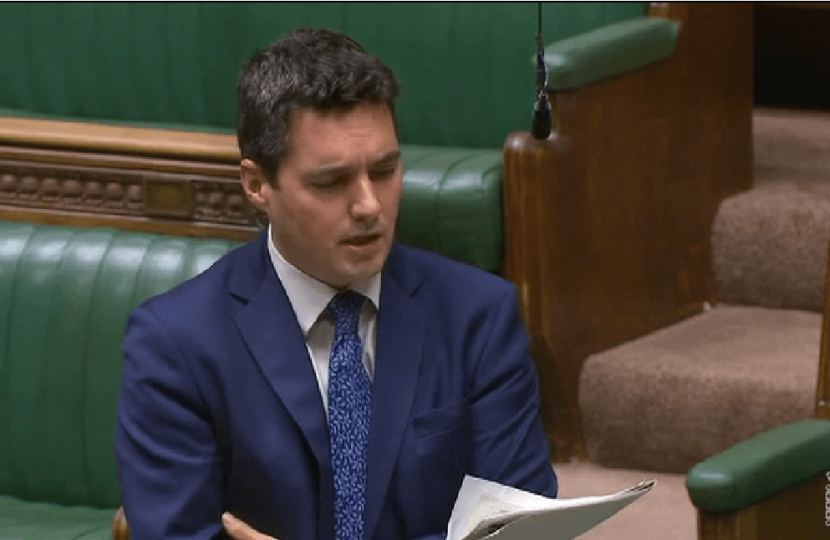
In a debate on education funding, Huw praised senior leaders and heads of schools across the country and especially in East Sussex for continuing to inspire students despite the pressures they face. He also praised the government’s educational record, citing record increases in funding and the number of pupils now enrolled in good or outstanding schools as examples of the government’s work.
Reflecting on his visit to 20 schools in Bexhill and Battle earlier in the year, Huw urged the government to go further by providing fairer funding for schools in East Sussex, by providing a higher wage for headteachers and by increasing pre-school funding.
Video of his speech here: https://goo.gl/RPRUJ3
Full text below:
It is a pleasure to contribute to this debate. I do my best to ensure that I always contribute to debates on school funding and the success of our schools and education sector.
I make this contribution off the back of spending a week—the same week as my party conference in Birmingham—visiting 20 of the schools in my constituency and giving presentations about what goes on in this place, the role of an MP, democracy and how it has evolved over the years, and some of the campaigns I am focused on, including on school funding. The pupils I met were so full of life. They are like sponges—they want to soak up everything they are taught. They are taught by outstanding teachers who work incredibly hard. The heads and senior leaders of those schools undoubtedly face a lot of pressures, yet still manage to motivate their pupils to be the best they can. I salute not just those 20 schools in my constituency, but all the schools in the country that do exactly the same. I will always have their back by ensuring that we give them the best we possibly can.
Having heard from the Opposition, let me say that we must give credit where credit is due as far as the past eight years are concerned. The fact that 1.9 million more pupils are in good or outstanding schools is testimony to not just the work that the Government are doing, but the schools themselves. It is the schools that have turned themselves around. I am very proud that all my local secondary schools are at that level, and doing incredibly well. Moreover, a record number of pupils are going to university and doing the best that they can.
The statistics are there. UK Government expenditure is 3.8% of GDP. In France the figure is 3.4%, in the United States it is 3.2%, and in Germany it is 2.6%. While there is more to be done, I think that the Opposition would have more credibility if they recognised those statistics and thought about how they could be built on, rather than trying to take them apart.
Funding has risen by record levels—it has increased from £41 billion, and soon it will be £43 billion. I have lobbied strongly for fair funding in my constituency. We were able to receive an extra 5% for our schools, and I am very grateful for that. However, we are still seeing unfairness in the system. The hon. Member for Stoke-on-Trent Central (Gareth Snell) spoke of funds being removed, as he put it. I ask him to look at the position from my perspective. Schools in my constituency will receive far less than those in his constituency, just as a starting point. That is before we take account of additional measures such as the pupil premium—before we consider the individual pupil. Why should students be worse off at the starting point just because they happen to go to school in East Sussex? This has been going on for decades, and it is just not fair—[Interruption.] Opposition Members should put themselves in my position, and see the situation as I do. It is not fair at all.
I absolutely support fair funding. Every single pupil, no matter where they go to school, should receive the same level of funding as the starting point, before further amounts are layered on as appropriate. Pupils come from Hastings, the most deprived town in the south-east, to schools in my constituency. They face challenges and difficulties, but they do not take the deprivation issues from Hastings. Of course I expect other Members to stand up for the schools in their constituencies, but they can imagine why I am doing exactly the same. I am pleased that the secondary school allocation for East Sussex is to rise from £4,300 per pupil to £4,800, but I shall continue to speak in this way until we have parity at the starting point.
In the couple of minutes remaining to me, I want to touch on a few issues that I have picked up from my visits to 20 schools a month ago. One is teachers’ pay. I lobbied heavily for extra money to be provided outside the schools budget, and I was delighted that the bulk of the pay rises will be funded outside it. However, I think that if a school spends 80% of its budget on staffing costs, it is fair enough to expect it to contribute something towards that, hence the 1%.
I believe that leaders should be paid to lead. I have talked about the challenges for heads and senior leaders. I do not think that a 2% rise on the upper spine and a 1.5% rise on the leadership spine reward what is a very challenging leadership role, and I think that they should be given more. On this point, I take issue again with the hon. Member for Stoke-on-Trent Central. I am sure that he would, like me, campaign for those headteachers to get a larger pay rise, but at the same time he is campaigning and voting against their receiving an extra £860 in the form of the increase in the tax allowance. For him to attack my hon. Friend the Member for Stoke-on-Trent South (Jack Brereton), who has actually given the headteachers that pay rise—the average headteacher pay is £68,000—strikes me as somewhat perverse. However, I would like the Government to look at pay, particularly at the senior levels.
Pre-school funding is also of great concern to me. I have lost a further two pre-schools in my constituency. Business rates are an issue, as are the national living wage and the fact that the hourly rate is not high enough to meet their costs. I recognise the £6 billion that the Government have provided for pre-schools, but I think they need to go that bit further and fund fully. That would be a successful policy.
Again, I salute my schools, their heads, and, indeed, the ministerial team, who have made my local schools good and outstanding.



